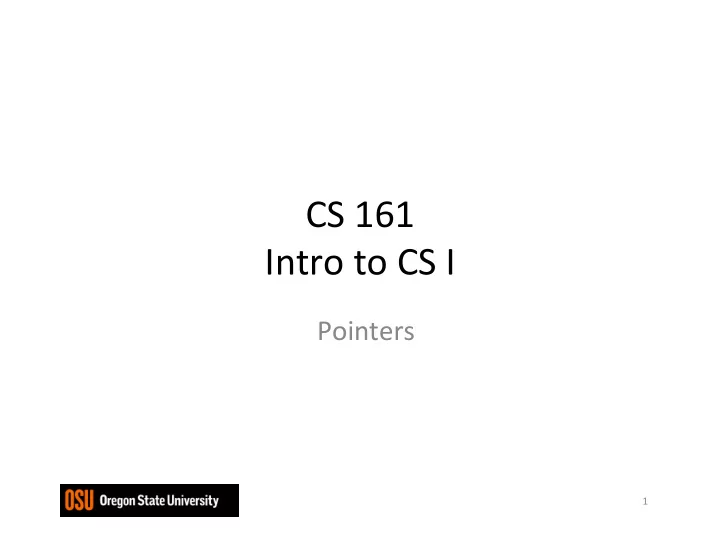

CS ¡161 ¡ Intro ¡to ¡CS ¡I ¡ Pointers ¡ 1 ¡
Introduc2on ¡ ¡ • Defini2on ¡ ¡ • Pointer ¡is ¡the ¡address ¡of ¡a ¡variable ¡in ¡memory ¡ ¡ 3AE17 ¡ 3AE37 ¡ 3AE57 ¡ 3AE77 ¡ 3AE97 ¡ 3AE57 ¡ • aPointer ¡ • You ¡may ¡remember ¡them ¡from ¡call-‑by-‑reference ¡ parameters ¡
Pointer ¡Variables ¡ • Pointer ¡is ¡a ¡type ¡ • Pointer ¡variable ¡holds ¡a ¡pointer, ¡i.e. ¡an ¡address ¡ • NOT ¡int ¡or ¡double ¡or ¡other ¡numeric ¡data ¡type! ¡ ¡ ¡ • Pointer ¡variable ¡declara2on ¡ ¡ • double ¡*ptr; ¡ • Pointer ¡to ¡double ¡ ¡ • Holds ¡pointer ¡to ¡only ¡type ¡double ¡ • Why? ¡ ¡ ¡
Pointer ¡“Jargon” ¡ • Pointers ¡hold ¡and ¡address. ¡ ¡But… ¡ ¡ • We ¡don’t ¡men2on ¡the ¡address ¡ • A ¡pointer ¡‘points’ ¡to ¡a ¡variable ¡of ¡the ¡correct ¡data ¡type ¡ ¡ • More ¡on ¡these ¡shortly ¡ • Dereferencing ¡a ¡pointer ¡is ¡ge[ng ¡the ¡value ¡stored ¡in ¡the ¡loca2on ¡ • Address ¡of ¡operator ¡allows ¡us ¡to ¡manipulate ¡the ¡address ¡ ¡
Poin2ng ¡ int ¡*ptr1, ¡*ptr2, ¡var1, ¡var2; ¡ ¡ ¡ ptr1 ¡= ¡&var1; ¡ ¡ & ¡is ¡the ¡address ¡of ¡operator ¡ ¡ Statement ¡sets ¡ptr1 ¡to ¡point ¡to ¡var1 ¡ ¡ Transla2on ¡ ¡ ptr1 ¡points ¡to ¡var1 ¡also ¡means ¡ ¡ ¡ ptr1 ¡equals ¡address ¡of ¡var1 ¡or ¡ ¡ ptr1 ¡holds ¡the ¡address ¡of ¡var1 ¡
Poin2ng ¡ Consider-‑ ¡ ¡ int ¡*ptr1, ¡*ptr2, ¡var1, ¡var2; ¡ ¡ ptr1 ¡= ¡& ¡var1; ¡ ¡ ¡ Two ¡ways ¡to ¡get ¡the ¡value ¡of ¡var1 ¡ ¡ var2 ¡= ¡var1; ¡ ¡ var2 ¡= ¡*ptr1; ¡ ¡ ¡ * ¡is ¡the ¡dereferencing ¡operator ¡ ¡ Retrieves ¡the ¡value ¡ptr ¡points ¡to ¡(i.e. ¡that ¡storage ¡loca2on) ¡ ¡
Example ¡ ¡ Consider-‑ ¡ var1 ¡= ¡0; ¡ ptr1 ¡= ¡&var1; ¡ *ptr1 ¡= ¡42; ¡ cout ¡<< ¡var1 ¡<< ¡endl; ¡ cout ¡<< ¡*ptr1 ¡<< ¡endl; ¡ Produces ¡output: ¡ 42 ¡ 42 ¡ ptr1 ¡and ¡var1 ¡refer ¡to ¡same ¡variable ¡ ¡ ¡
Assigning ¡Pointers ¡ Pointer ¡values ¡can ¡be ¡assigned ¡to ¡other ¡pointers ¡ int ¡*p1, ¡*p2; ¡ ¡ p1 ¡= ¡p2; ¡ ¡ Assigns ¡pointer ¡2 ¡to ¡pointer ¡1 ¡ ¡ P1 ¡now ¡points ¡to ¡where ¡p2 ¡points ¡to ¡ ¡ ¡ Consider ¡this-‑ ¡ ¡*p1 ¡= ¡*p2; ¡ ¡ ¡ What’s ¡different? ¡ ¡ ¡ ¡ Value ¡in ¡p2 ¡is ¡placed ¡in ¡p1 ¡ ¡ ¡ The ¡pointers ¡(i.e. ¡the ¡addresses) ¡do ¡not ¡change ¡ ¡ ¡ ¡
Sta2c ¡ Memory ¡allocated ¡at ¡compile ¡2me ¡ i ¡ 7 ¡ ¡ &i ¡ <addr1> ¡ Variable ¡= ¡Value ¡Seman2cs ¡ i ¡ 7 ¡ Variable ¡name ¡associated ¡to ¡memory ¡ &j ¡ <addr2> ¡ loca2on ¡ Value ¡stored ¡ ¡ Copy ¡of ¡value ¡is ¡used ¡ ¡ ¡ ¡ int ¡i, ¡j ¡= ¡2; ¡ i ¡= ¡j; ¡ ¡ ¡
Dynamic ¡ Memory ¡allocated ¡at ¡run2me ¡ i ¡ <addr2> ¡ Memory ¡comes ¡from ¡the ¡heap ¡ &i ¡ <addr1> ¡ ¡ *i ¡ Pointer ¡= ¡Reference ¡Seman2cs ¡ 2 ¡ Allocate ¡memory ¡ <addr2> ¡ Address ¡stored ¡in ¡pointer ¡variable ¡ ¡ int ¡*i ¡= ¡NULL; ¡ i ¡= ¡new ¡int; ¡ ¡ *I ¡= ¡2; ¡ ¡ ¡
Memory ¡Leak ¡ ... int main () { int *i=NULL; //created in main function while(1) { i = new int; } } ¡ Memory ¡allocated ¡in ¡the ¡heap ¡and ¡not ¡released ¡
Plugging ¡the ¡Leak ¡ ... int main () { int *i=NULL; //created in main function while(1) { i = new int; delete i; frees or releases the memory } } ¡ Memory ¡allocated ¡in ¡the ¡heap ¡is ¡now ¡available ¡to ¡use ¡elsewhere ¡ in ¡your ¡program ¡ ¡ ¡
Arrays ¡ ¡ • Pointer ¡is ¡the ¡address ¡of ¡the ¡first ¡array ¡element ¡ ¡ ¡ ¡ ¡ ¡ ¡ ¡ ¡ ¡ ¡ ¡Address ¡ 3AE17 ¡ 3AE37 ¡ 3AE57 ¡ 3AE77 ¡ 3AE97 ¡ array1 ¡ 3AE17 ¡ Array1[2] ¡= ¡3AE17 ¡+ ¡2* ¡20 16 ¡= ¡3AE57 ¡(address ¡of ¡element ¡3) ¡ ¡ • You ¡may ¡also ¡remember ¡them ¡from ¡call-‑by-‑reference ¡ parameters: ¡ ¡int ¡foo(int ¡&x); ¡ ¡ ¡
Sugges2on ¡ Is ¡this ¡confusing? ¡ ¡ YES ¡ ¡ ¡ ¡ It ¡will ¡never ¡make ¡sense ¡unless ¡you ¡write ¡ programs ¡and ¡use ¡pointers! ¡ ¡ ¡ ¡ It ¡will ¡never ¡make ¡sense ¡unless ¡you ¡write ¡ programs ¡and ¡use ¡pointers! ¡ ¡ ¡ ¡ ¡ ¡ ¡ ¡
Recommend
More recommend